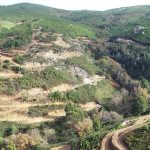Porto business leaders call for less red tape in real estate
Entrepreneurs in Porto have called on authorities and municipal councils to cut the amount of red tape and time taken in approving real estate investments so that investors can invest quickly and efficiently in Porto.
The entrepreneurs also want policies that attract and fix more labour in the region, and offset the collateral effects of tourism pressures such as the decharacterisation of the city centre. These were just some of the suggestions left by business leaders who attended the 6th edition of the debate ECO Local/Novobanco which took place last week.
Jorge Quintas, CEO of the Nelson Quintas Group, called on the debureaucratisation of real estate investment processes. “We have great difficulty in investing quickly like we would like to. We face many difficulties in moving forward. The biggest block is red tape because the investor has to deal with various entities. Nevertheless, we’re not pulling out and we’ll continue to invest”, said the family office head who is currently converting the former Hospital da Ordem do Carmo into a five-star hotel.
“We are real estate investors and another difficult we face is in tourism and the lack of staff”, he said.
Rui Magalhães CEO of the Fladgate Partnership which owns various bands of port and other wines, and owns the famous hotel The Yeatman in Vila Nova de Gaia, said Fladgate suffered the same problem of “staff going off to work in other countries like France which offer better pay”.
And added: “We pay well in relation to the market, but even so we cannot retain staff. We can’t pay the same salaries as in France. We have Brazilian staff and we went to São Tomé and Príncipe to get staff. In the kitchen we’ve taken on Pakistani citizens. These are signs of the times and there’s nothing to be done”, he said.
Filipe Barrias, CEO of the Barrias Group which owns various hotel groups such as São de Açúcar Hotel and the historic cafés Guarany and Majestic, said he was pleased with the recovery of the tourism market”.
Even so, the entrepreneur pointed out the challenges of decarbonisation and energy efficiency for the coming years.
He also drew attention to protecting traditional old-fashioned shops which are “under threat of being dispossessed” and praised the fact that Porto had a municipal law protecting them.
However, Porto Council officer for the Economy, Ricardo Valente said that traditional shops had a problem from the real estate point of view which was they need to be protected from substantial rent hikes. “We have to find a middle ground between local and national rules in which the state protects these traditional shops”.










